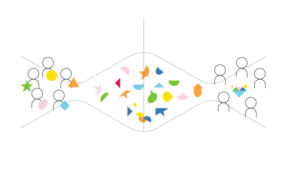Constructive interaction a key factor in remote teams seeking solutions to societal problems

According to a new study, the activities of successful remote teams depend on the possibilities of the members to participate, and on the conscious practice of building bridges between different points of view. By successful remote teams, the researchers mean teams that participate equally and move forward evenly.
'For finding solutions, it was also important for the team to retain different options for moving forward before solving a problem. Constructive interaction and keeping an open mind to different points of view proved to be important factors in remote teamwork in the exceptional time', note researchers Satu Rekonen and Kari Jalonen of Aalto University.
Future societal problems will be solved together
A study by Aalto University followed four teams working on societal problems over a seven-month period. The teams took part in the training programme of the Finnish Innovation Fund Sitra's Sitra Lab, in which experiments were used to search for nature-based solutions to the challenges of urbanisation. Members of the teams represented different sectors of society and different fields.
'I believe that observations applying to Sitra Lab can be applied to most teams of experts comprising representatives of different fields, in which complex problems are solved', Rekonen observes.
Material was collected by observing selected teams in 2020, the first year of the coronavirus pandemic. More than 220 hours of observational material was collected. In addition, researchers conducted 35 interviews. Data analysis is still ongoing but preliminary findings have already been identified.
Successful remote teams verbalise their thoughts
Equally participating teams typically verbalise personal thoughts to others and soften one's own message using interactive means that others can easily join.
The teams also made sure that nobody is sidelined in a discussion. If one of the participants had been in the role of a listener for a long time, one of the other members made sure that this person was also heard, for example, by directly asking their views of the recent discussion. This helped members make sure that the expertise of all members was included in the choices that were made.
Teams capable of change can also utilise different types of expertise
When solving societal problems, the diversity of the teams and a variety of views are an asset. However, a team comprising experts of different types does not guarantee that matters will be examined from multiple points of view, or that a broader point of view would be utilised.
The team should also be able to utilise different kinds of expertise in the team. Strong expertise for the future is more than deep knowledge of one's own field, it is also an ability to have a conversation with other experts and participants. Good interaction helped the teams make progress, and typical of this was that in conversation, elements were built on top of previous exchanges of thought, and one's own views were linked to the conversation that was had.
However, people did not adhere to their own points of view so strongly that these would have become an obstacle to the shared thinking and forward movement of the team. For the team to advance to a concrete conclusion in the allotted time, an individual member of the team would occasionally need to let go of their own idea and point of view.
Further information:
Satu Rekonen
Postdoctoral researcher
Aalto University
Tel. +358 50 521 4874
satu.rekonen@aalto.fi
Riina Pulkkinen
Leading Specialist
Sitra Lab training programme
Finnish Innovation Fund (Sitra)
Tel. +358 294 618 430
riina.pulkkinen@sitra.fi
Read more news

Environmental Structure of the Year 2025 Award goes to Kalasatama-Pasila tramway
The award is given in recognition of meritorious design and implementation of the built environment. Experts from Aalto University developed sustainability solutions for the project.
A Bloc becomes a “living lab” for Aalto students: Entrepreneurial Futures course and Cafetoria join forces in pop-up collaboration
A Bloc’s pop-up space turned into a hands-on learning environment when Entrepreneurial Futures course and Cafetoria co-created a pop-up.
What drives success in the film and audiovisual industries? New research to support growth and competitiveness
Aalto University Department of Film is leading a €1.6 million Co-Innovation research project, SmartSuccessAV, funded by Business Finland. The project aims to gain new research-based knowledge on how success in the Film and AV industry is managed and how decision-making is structured as production, financing, and distribution structures change.






